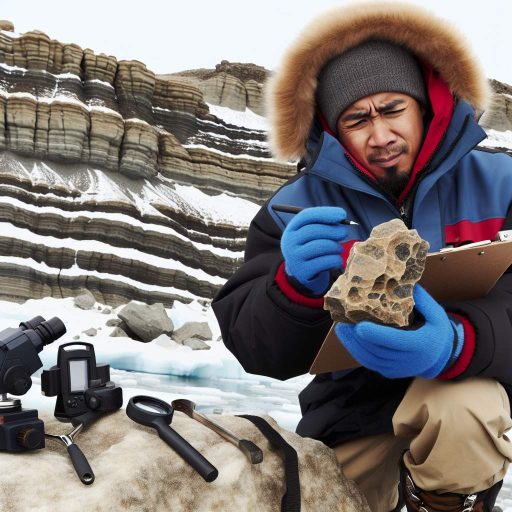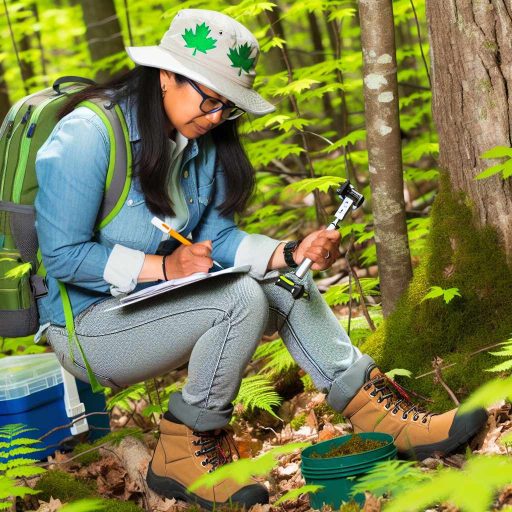Understanding the Importance of Networking in Ecology
Building Professional Connections
Networking helps you establish essential professional relationships.
These connections can open doors to various opportunities.
By attending events, you can meet experienced ecologists.
Additionally, you can connect with potential collaborators.
Every relationship you build can lead to new projects.
Staying Informed and Inspired
Networking keeps you updated on the latest research and trends.
Engaging with experts exposes you to diverse knowledge.
You will discover innovative methods and techniques in ecology.
This exposure inspires personal and professional growth.
Creating a network means sharing insights and ideas regularly.
Accessing Resources and Opportunities
Your professional network provides access to valuable resources.
Many positions and internships are often shared within networks.
Networking increases your chances of finding funding opportunities.
Moreover, it opens doors to academic partnerships.
Your peers can recommend workshops and seminars in the field.
Enhancing Career Development
A strong network can positively impact your career trajectory.
Through connections, you gain guidance on career advancement.
You may receive mentorship from experienced professionals.
Networking helps you learn about promising career paths.
These relationships can lead to job offers and recommendations.
Identifying Key Networking Opportunities in Canada
Professional Conferences and Workshops
Attending conferences is essential for new ecologists.
These events provide valuable networking opportunities.
Canadian Ecology and Evolutionary Biology Society hosts an annual conference.
It allows ecologists to share research and connect with peers.
Moreover, workshops often feature experts like Dr. Emily Richards.
Unlock Your Career Potential
Visualize a clear path to success with our tailored Career Consulting service. Personalized insights in just 1-3 days.
Get StartedThese sessions can enhance your skills and expand your network.
Academic Collaborations
Collaborating with universities can lead to new connections.
Consider reaching out to local universities in your area.
Professors like Dr. Amir Patel may have ongoing projects.
Joining research teams can increase your visibility.
Furthermore, academic collaborations often result in co-authored papers.
Local Conservation Groups
Joining local conservation organizations offers networking benefits.
Groups like EcoAction Community Fund engage volunteers regularly.
Participating in their events can help you meet experienced ecologists.
Additionally, these interactions may lead to mentorship opportunities.
Online Networking Platforms
Social media platforms are vital for connecting with other ecologists.
LinkedIn provides a professional environment for networking.
Join relevant groups to stay updated on industry trends.
Twitter is another excellent tool for following experts in ecology.
Engage with their posts to initiate conversations.
Networking through Volunteering
Volunteering can enhance your network while helping the community.
Organizations like Nature Conservancy of Canada welcome volunteers.
Such roles allow you to meet passionate professionals.
Moreover, volunteering can lead to job recommendations.
Ultimately, it helps you gain practical experience in the field.
Leveraging Social Media for Professional Connections
Understanding the Importance of Social Media
Social media is a powerful tool for networking.
It allows ecologists to connect with peers globally.
Using platforms like Twitter and LinkedIn enhances visibility.
These platforms provide access to a diverse professional community.
Selecting the Right Platforms
Choosing the appropriate platform is essential for effective networking.
LinkedIn is great for professional connections.
Twitter can help you engage in ongoing discussions.
Instagram is useful for sharing visual content related to ecology.
Building Your Online Presence
Your online profile represents your professional identity.
Keep your profiles updated with relevant information.
Highlight your research and achievements effectively.
Engage with content that aligns with your interests.
Engaging with the Community
Active participation can lead to valuable connections.
Comment on posts from other ecologists to share insights.
Share articles and findings relevant to your field.
Join groups or forums focused on ecology to expand your network.
Networking Through Content Creation
Creating your own content can showcase your expertise.
Write blog posts about your research and experiences.
Consider hosting webinars to share knowledge with a wider audience.
Videos and infographics can make your content more engaging.
Following Industry Leaders
Identify key figures in the ecology field to follow.
Engage with their posts by liking and sharing.
Take note of their insights and industry trends.
By doing so, you can establish your presence within the community.
Navigating Virtual Events
Participate in webinars and online conferences regularly.
These events often feature networking opportunities.
Connect with other participants during breakout sessions.
Follow up with individuals you meet through social media.
Find Out More: The Connection Between Oceanography and Global Science
Attending Conferences and Workshops
Maximizing Networking Opportunities
Networking at conferences is vital for new ecologists.
Take the initiative to introduce yourself to others.
Start conversations with fellow attendees during breaks.
Don’t hesitate to ask questions during sessions.
This will engage speakers and fellow participants.
Remember, everyone is there to learn and connect.
Choosing the Right Events
Select conferences that align with your interests.
Research past events to gauge participation and success.
Look for workshops that offer hands-on experiences.
Consider both local and national conferences.
Each event provides unique networking opportunities.
Preparing for Engagement
Prepare a brief introduction about yourself.
Highlight your research interests and background.
Bring business cards to share with new contacts.
Set clear goals for each conference you attend.
Identify key individuals you would like to meet.
Following Up After Events
Maintain connections after the event concludes.
Reach out via email to people you met.
Express appreciation for their time and insights.
Connect with them on professional networking platforms.
This will reinforce your new relationships.
You Might Also Like: Steps to Land a Job as a Geneticist in Canada
Building Relationships with Professors and Industry Professionals
Importance of Professional Networking
Networking is crucial for new ecologists in Canada.
It opens doors to opportunities and collaborations.
Successfully connecting with professionals benefits your career.
Additionally, it provides access to valuable resources.
Connecting with Professors
Professors can be significant mentors during your studies.
Engage with them by attending office hours regularly.
Ask questions related to their research topics.
This shows your interest and helps build rapport.
Be proactive in seeking research opportunities with them.
Participating in projects can enhance your experience tremendously.
Utilizing Social Media
Use platforms like LinkedIn and Twitter to connect with professionals.
Share your academic achievements and interests online.
Comment on their posts to engage with their work.
Thus, you can build visibility within the ecology community.
Attending Conferences and Workshops
Conferences are excellent for networking with industry experts.
Participate actively in discussions and workshops.
Exchange contact information with fellow attendees.
Follow up with an email to keep the conversation going.
These events can lead to valuable collaborations in the future.
Finding Volunteer Opportunities
Volunteering for projects provides practical experience.
It enhances your resume and builds your network simultaneously.
Look for opportunities with environmental organizations.
Connecting with peers and professionals during these activities is vital.
Seeking Informational Interviews
Informational interviews help in gaining insights about the field.
Reach out to professionals you admire for advice.
Prepare thoughtful questions about their career paths.
This strategy demonstrates your commitment and curiosity.
Subsequently, it can lead to mentorship opportunities.
Delve into the Subject: Essential Fieldwork Tips for Wildlife Biologists
Utilizing Local Ecological Organizations and Societies
Finding Your Local Networks
Local ecological organizations provide vital networking opportunities for new ecologists.
These groups often have diverse members who share valuable knowledge.
Additionally, they frequently host events that foster connections among professionals.
Research your regional organizations to discover their activities.
Connect with groups such as the Canadian Ecological Society or local conservation clubs.
Attending Workshops and Talks
Participation in workshops and public talks enhances your understanding of local ecology.
These events allow direct interactions with experienced ecologists and researchers.
Be proactive in asking questions during these sessions to gain insights.
Moreover, consider volunteering at these events to increase your visibility.
Joining Online Platforms
Online platforms serve as excellent tools for networking in today’s digital age.
Connect with local ecological societies through social media and professional networks.
Monitors community forums and chat groups for valuable discussions.
These platforms can help you stay updated on local projects and issues.
Participating in Citizen Science Projects
Citizen science projects engage the public in real-world ecological research.
Joining these projects can connect you to like-minded individuals.
Furthermore, it equips you with practical skills and experience.
Explore organizations like Parks Canada or Wildlife Conservation Society for opportunities.
Creating Relationships with Mentors
Establishing a mentor-mentee relationship can significantly enhance your career.
Seek out experienced ecologists willing to share their expertise.
Attend networking events where these professionals are likely to be present.
Build meaningful connections that can lead to valuable guidance and support.
Gain More Insights: Educational Pathways to Become a Geologist

Engaging in Volunteer Opportunities to Expand Your Network
Benefits of Volunteering
Volunteering offers valuable networking opportunities for new ecologists.
It allows you to meet experienced professionals in your field.
Additionally, volunteering helps you develop essential skills.
You can gain hands-on experience that enhances your resume.
Furthermore, it enables you to contribute positively to your community.
Finding Volunteer Opportunities
Start by exploring local environmental organizations.
Organizations such as the EcoAction Community Fund offer various roles.
Use online platforms like Volunteer Canada to find suitable postings.
You can also check university bulletin boards for volunteer options.
Network with professors who may know of available opportunities.
Making the Most of Your Volunteer Experience
Be proactive in connecting with fellow volunteers.
Attend events related to your volunteer work.
Engage in conversations and express your interests and goals.
Consider asking for mentorship from experienced volunteers.
Follow up with the people you meet through email or social media.
Leveraging Social Media
Use social media to showcase your volunteer activities.
Share photos and experiences on platforms like LinkedIn and Instagram.
Tag organizations to increase visibility and connect with others.
Join online groups related to ecology and conservation.
Participating in discussions can broaden your professional connections.
Effective Communication Skills for New Ecologists
Building Confidence in Communication
Developing strong communication skills enhances your professional presence.
Practicing public speaking can build your confidence.
Join local workshops or online seminars in ecology to practice.
Consider engaging in discussions at conferences to refine your skills.
Understanding Your Audience
Identifying your audience is crucial for effective communication.
Tailor your message according to their knowledge level and interest.
Ask questions to gauge their understanding during presentations.
This engagement fosters a deeper connection and results in better feedback.
Utilizing Visual Aids
Visual aids can enhance your message significantly.
Use clear and relevant graphics to illustrate your points.
Make sure they complement your verbal explanation instead of overwhelming it.
Consider tools like PowerPoint or Prezi for interactive presentations.
Active Listening Skills
Effective communication is not just about speaking.
Practice active listening to show respect and understanding.
Note key points during discussions to summarize later.
This technique encourages open dialogue and collaboration.
Developing Written Communication
Strong writing skills are essential in ecology.
Practice writing reports and research papers regularly.
Consider engaging a peer for feedback on your drafts.
Refining your writing increases clarity and professionalism.
Networking and Relationship Building
Networking is a vital part of ecological work.
Attend conferences and workshops to meet professionals in the field.
Join local ecological societies or online forums for support.
Build relationships and stay in touch with peers for opportunities.
Seeking Mentorship
Finding a mentor can greatly enhance your career progression.
Look for experienced ecologists who share your interests.
A mentor can provide valuable advice and insights into the field.
Build a relationship based on mutual respect and open dialogue.
Creating a Professional Brand: Resumes and Online Profiles
Importance of a Strong Resume
A strong resume showcases your skills and experiences effectively.
It serves as your first impression to potential employers.
Employers often skim resumes quickly, so clarity is key.
Highlight relevant experiences that demonstrate your qualifications.
Use action verbs to convey your achievements assertively.
Include specific metrics to quantify your accomplishments.
Structuring Your Resume
Start with your contact information at the top.
Then, write a concise summary of your professional goals.
Follow this with a list of your relevant experiences.
Provide information on your education, internships, and certifications.
Finally, add skills that are relevant to the ecological field.
Keep formatting consistent to ensure readability.
Creating an Online Profile
An online profile complements your resume and extends your reach.
LinkedIn is the most popular platform for professionals.
Use a professional photo that represents you well.
Write a compelling headline that captures your expertise.
Fill out your profile thoroughly, highlighting your accomplishments.
Engage with content relevant to your field to increase visibility.
Networking Through Online Profiles
Connect with fellow ecologists to expand your professional network.
Join groups focused on ecology and environmental issues.
Participate in discussions to showcase your knowledge and insights.
Share articles or research that align with your interests.
Regular contributions can attract attention from potential employers.
Updating Your Profiles Regularly
Keep your online profiles current with your latest experiences.
Regular updates reflect your growth and ongoing professional development.
Adjust your profile settings to highlight specific skills as needed.
Engage with your network by commenting on their updates.
This fosters relationships and opens doors to new opportunities.
Following Up: Maintaining Connections and Building Long-Term Relationships
The Importance of Following Up
Following up is a crucial part of networking.
It prevents initial connections from becoming vague memories.
Timely follow-ups show your interest and professionalism.
Through follow-ups, you can reinforce your relationships.
Choosing the Right Time
Timing is key when reaching out to your contacts.
Try to follow up within a week of meeting someone.
This timing helps keep the conversation fresh in their minds.
If you missed the week, don’t worry.
A follow-up is still valuable, even if delayed.
Methods of Following Up
There are various methods to follow up effectively.
- Email is the most common method.
- Consider a brief phone call to connect on a deeper level.
- Social media platforms can also be useful for informal follow-ups.
Choose the method most appropriate for your relationship.
What to Include in Your Follow-Up
Your follow-up should be concise and thoughtful.
Start by expressing gratitude for their time.
Reference specific points from your earlier conversation.
This shows attentiveness and genuine interest.
Lastly, suggest a future meeting or discussion.
Staying Engaged with Your Network
Maintaining relationships requires ongoing engagement.
Share articles or resources that may interest your contacts.
Send congratulatory messages for their achievements.
Invite them to events or discussions relevant to your shared interests.
Building Long-Term Relationships
Relationships flourish with mutual support and understanding.
Regularly check in with your contacts.
Consider their needs and offer assistance when possible.
Encourage open communication to foster trust.
Finally, be patient; strong connections take time to develop.
Additional Resources
Society for Ecological Restoration
‘Mother Tree’ Ecologist Suzanne Simard Shares Secrets Of Tree …




